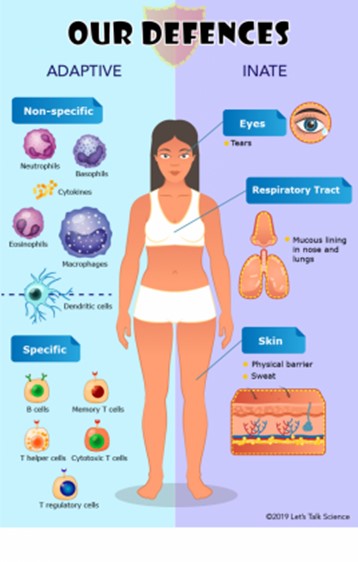Which of the following represents the first line of defense to an intruding pathogen?
Adaptive immunity
Antibodies
Innate immunity
T cells
The Correct Answer is C
Innate immunity represents the first line of defense to an intruding pathogen.
The innate immune system is a series of nonspecific defenses that make up the innate immune system.

These defenses are not directed against any one pathogen but instead provide a guard against all infection.
Choice A is incorrect because adaptive immunity is activated when pathogens are able to bypass innate immune defenses.
Choice B is incorrect because antibodies are part of the adaptive immune system and are produced by B cells.
Choice D is incorrect because T cells are part of the adaptive immune system and assist B cells or directly kill infected cells.
Nursing Test Bank
Naxlex Comprehensive Predictor Exams
Related Questions
Correct Answer is C
Explanation
Granzymes are a family of serine proteases that are stored in and secreted from the cytotoxic granules of cytotoxic T lymphocytes (CTL) and natural killer (NK) cells.
They work in synergy with perforin, a pore-forming toxin, to induce apoptosis in target cells.
Perforin is necessary for the delivery of granzyme B to the target cell cytosol where caspase-dependent and -independent pathways to apoptosis are activated.
Perforins (choice A) are pore-forming toxins that work in synergy with granzymes to induce apoptosis in target cells.
Cytokines (choice B) are signaling molecules that regulate immune responses but do not directly induce apoptosis in target cells.
Interferons (choice D) are a type of cytokine that play a role in immune responses but do not directly induce apoptosis in target cells.
Correct Answer is D
Explanation
The medication prescribed to the patient is a diuretic, which removes water and electrolytes from the body by increasing urination 1.
This helps reduce fluid buildup in the body.
Choice A, Inhibits the renin-angiotensin-aldosterone system, is not the correct answer because it describes a different mechanism of action.
Choice B, Blocks beta receptors, is not the correct answer because it describes a different mechanism of action.
Choice C, Increases sodium and water reabsorption, is not the correct answer because it would have the opposite effect of reducing fluid buildup.
Whether you are a student looking to ace your exams or a practicing nurse seeking to enhance your expertise , our nursing education contents will empower you with the confidence and competence to make a difference in the lives of patients and become a respected leader in the healthcare field.
Visit Naxlex, invest in your future and unlock endless possibilities with our unparalleled nursing education contents today
Report Wrong Answer on the Current Question
Do you disagree with the answer? If yes, what is your expected answer? Explain.
Kindly be descriptive with the issue you are facing.
